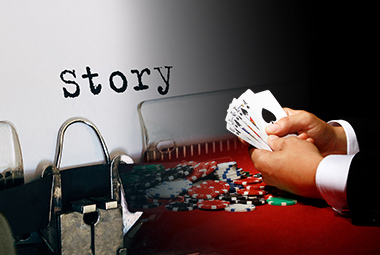Introduction
What made the poker boom of the late 90’s and early 2000’s successful, at least in my opinion, was the mystique and characters surrounding the game.
Poker had a certain level of mystique to it in that televised presentations generally consisted of either major World Series of Poker (WSOP) or World Poker Tour (WPT) tournaments. Televised events that didn’t fall into either of those categories would usually consist of some of the most well-known, and occasionally over the top (looking at you, Matusow and Hellmuth) personalities, on such programs as NBC’s Poker After Dark.
Another element that added to the mystique is that casinos and poker rooms were regulated and legalized in significantly fewer of the United States than they are today. Alaska and Hawaii aside, chances are that you either live in a state that has a regulated poker room somewhere, or alternatively, border a state that does.
The entire affair would result in people discovering online poker, which turned out not to be without its own scandals, playing in home games, or with the spread of legalized poker throughout the United States, getting into casino cash games, local casino tournaments, and occasionally, satellite tournaments to get into larger broadcasted tournaments.
Most of the televised poker tournament presentations were of the highest quality, with excellent announcers, such as the deceased Mike Sexton, and others with a deep understanding of the game such that they could take you into the minds of the players at the table as they made their decisions.
There was also a sort of accessibility to poker, or at least, the appearance thereof. Unlike professional sports athletes who have typically trained all of their lives to rise to the top of their game, it is true that you can start relatively late in life and become a competitive poker player provided you put the time and study into it. Chris Moneymaker is an example of this–an accountant who came seemingly out of nowhere to win the 2003 World Series of Poker Main Event. With no offense meant to him, he contributed greatly to the poker boom in that someone could look at this former accountant and say, “Well, if he can play top level poker, then certainly I’d have a chance.”
DIMINISHING RETURNS
As with any fad, the poker boom couldn’t last forever.
One of a few daggers through the heart came from the Full Tilt Poker scandal (link to article above) as that very scandal would lead to a swath of players coming to trust online poker less, and for significantly valid reason.
Beyond that, some players simply got really good at online poker. Many such players didn’t necessarily have their sights set on WSOP bracelets and were perfectly content just to dominate relatively low-moderate limit games online.
Prior to making her return to poker, arguably the greatest female player to ever live, and inarguably one of the top players to ever live, Vanessa Selbst, retired stating that poker had become too much like a job, given the level of competition. Furthermore, at the time of her retirement, she had a partnership with PokerStars by which part of her job was to represent that, with hard work and study, players could be successful and make money on the game online; the problem being that she no longer felt that to be true.
Ultimately, poker did proliferate into many states, as has already been mentioned—and with that, the mystique also disappears to a certain extent. If you go into the local casinos, then you’ll often find yourself in the presence of sweaty and loud drunks who are often dropping money that they simply can’t afford to lose. There are no lights, no cameras and no fame-only action.
There’s simply no glamor to the local poker rooms, or even the illusion of glamor that television broadcasts would present.
Yes, the illusion. Let’s start with the fact that the World Series of Poker was held at The Rio for a very long time. Sure, it plays great on TV, but in reality and in any other context—The Rio is a poorly lit (almost pitch black, but for the machines) dump of a casino that’s not even located on the Las Vegas Strip. Honestly, the majority of local casinos that I have been to (and I have been to some dumpy and very out of the way ones) are more inviting than The Rio. Of course, they’re also generally newer (many such states didn’t even have legalized gambling at the time Rio opened) which doesn’t hurt the cause.
THE ILLUSION IS GONE
Honestly, if anything has hurt poker, then I would say it is social media.
Granted, you might think that social media would benefit the cause, but it absolutely doesn’t. At least, not on balance.
Part of the illusion offered on TV—the tournaments, the laughing, the smiling faces…was all that TV picks what it gets to show. Of course, you can do the same thing on social media…in theory.
Unfortunately, for poker, social media offers even more of a peek behind the curtain of poker than would ever benefit it as a game. There is no mystique, and increasingly, there are no secrets.
The world of poker is a world that is plagued with a variety of epidemics, including:
- Addiction
- Fleecing People for Money
- Borrowing/Lending
- Cheating
- Allegations/Suspicions of Cheating
- Online Poker Solvers
- Petty Interpersonal Drama
All of which are broadcast, and loudly, for anyone in the entire world to see, provided they are paying the slightest amount of attention.
Naturally, some individuals or groups will benefit from this increased exposure. Arguably the greatest heads-up (read: one on one) online poker player to ever live, and YouTube creator, Doug Polk, would certainly know. He has nearly 400,000 YouTube subscribers and many of his videos have view counts in the hundreds of thousands. His average video probably does something like high five-figures in view count.
Of course, the majority of Polk’s content is both interesting and potentially useful to new and experienced players alike. His hand breakdown videos tend to be pretty good and offer deep dives into what players are thinking as they make their decisions. Furthermore, his series of heads-up online games against one of the greatest players to ever live, Daniel Negreanu, is arguably the greatest thing to happen in poker in a half decade, or more.
Unfortunately, Doug Polk also has a penchant for diving into drama taking place in the world of poker, which is (in part) what I am going to be doing in this series of articles, but I consider myself an outsider looking in.
Naturally, we live in a culture that, in my estimation, is obsessed with interpersonal drama. Worse than this, we live in a society that just revels in people taking a public fall. It seems that if anyone achieves any amount of success or fame whatsoever, there is always going to be someone out there who wishes to knock them off of that pedestal…however low the pedestal might be.
Of course, most people wouldn’t be inclined to do such a thing. Unfortunately, for every person that is inclined to take someone down for virtually no reason, there are probably tens of thousands of people who are perfectly happy to watch it happen.
THINGS ARE RARELY WHAT THEY SEEM
The fact of the matter is that things are rarely what they seem. That’s not just in poker, but in anything.
One of the aspects that made the poker boom successful is the fact that most people only saw what the television producers and events wanted them to see, as we discussed above. When we get down to the nitty-gritty, however, poker is a highly predatory industry that is full mostly of downtrodden low-stakes grinders trying to rise, as cream, to the top in a world of ever decreasing returns.
In order for poker to succeed, poker has to get money that comes from outside of poker; otherwise, it can only eat its own.
Consider the rake in a cash game. Let’s imagine for a second that we have a theoretical cash game with nine players. The rules of the game are that each player must buy-in for $1,000,000; the game will continue with betting limits of $5/$10, depending on round of betting, and the game can only conclude when there is one player left. It’s also a limit game.
No poker professional would ever play in such a game. Given the fact that the casino takes a rake of every pot, the only thing that would happen is eight players are guaranteed to eventually lose $1,000,000 and the last man or woman standing, in all likelihood, would leave the table with significantly less than the $1,000,000 that he or she started with.
With that, individual channels and outlets might do well giving people a look behind the curtain of poker’s stage, but they are absolutely not doing poker itself any favors. The poker boom was built on mystique and illusion; not only have those things been removed for anyone even paying passing attention, but more than that, poker airs out-by one mechanism or another-A TON of its own dirty laundry. It’s basically your next door neighbor in a poor community that dries their still-stained clothes on the clothesline in their backyard…and they do not have a fence.
To be clear, that’s not unique to poker. In exploring the concept of multi-level marketing companies in this article, I made reference to a Youtuber called Illumnaguhtii. Evidently, for a channel dedicated to calling things out for not being as they seem, not everything was as it seemed with Illuminaughtii, either.
Recently, there have been public allegations to the extent that she coerced her own employees, at least one of whom she was engaged in a sexual relationship with, into entering tremendously one-sided, and possibly illegal, financial contracts with her. You can dig deeper than that if you wish, but there is a former romantic partner of hers as much as accusing her of holding him in what would be, if true, functional indentured servitude.
I’d like to say that I am surprised, but I can’t. As the last couple of years have played out, I ultimately stopped watching any of her videos. The first thing that I noticed is that she would occasionally, and in a highly self-righteous tone, call out individuals and companies who arguably didn’t really deserve it. More to the point, she would often get into playing the social justice/far-left propaganda card virtually every other sentence, and to me, when I see someone being so self-righteous, they almost have to be hiding something. I’d had enough. I’d love nothing more than to say that I’m shocked that such skeletons would be living in Illuminaughtii’s closet, but no, not surprised in the slightest.
If you assume the worst, you’ll generally be right. Actually, what she’s being alleged of doing is worse than anything I could have even conjured up, but her transitioning from highly critical to cranking the holier-than-thou dial up to 11 had me highly suspicious.
POKER WORLD SCANDALS
Of course, the poker world has been no stranger to scandals.
How many scandals do you want? Just pick a number. There are any number available to you.
One recent scandal was that of Jami LaFay, a female low-stakes grinder who created a GoFundMe seeking money to help treat her life-threatening cancer. I didn’t have any particular interest in that person, but I had wanted to write an article about bogus GoFundMes for sometime and needed a gambling tie-in, so that worked out.
Of course, in Jami’s story, I found what I suspected to be elements of truth to her claims. Essentially, my conclusion is that the situation simply wasn’t as dire as she represented, but it does seem to be the case that she has non-zero health issues.
Staying on the fake cancer train, PokerFraudAlert would later discuss an individual named Rob Mercer, one key difference with Mercer being that there wasn’t even a kernel of truth to his claims. I’d be shocked for anyone to accuse me of gender bias (for not writing an article about Mercer), but to be clear, the main thing I wanted to do was write an article about scam GoFundMes, and Jami LaFay was my gambling tie-in, by the time the Mercer thing happened, that article had already been long-published. If these two things had happened in the opposite order, then I’d have discussed Mercer in an article, but not LaFay.
Oh, Doug Polk also has a video about Rob Mercer’s cancer fraud scam, should you wish to look for that. I’ll provide a link here. Again, personal financial benefit aside, I’m not sure why Doug Polk would want to make poker look even worse than it already does, but there you go. Finally, WOW-some poker players just have, ‘Sucker,’ written on their foreheads. Did you look at the LaFay thing and learn nothing?
Another recent scandal that I covered is the now-legendary hand between insufferable and narcissistic fop, Garrett Adelstein, and Robbi Jade Lew. You can read that article for more information, but essentially, Garrett Adelstein blew a valve over losing a moderately suspicious looking hand and went on a whiny rampage like the six year old girl that he is.
Seriously. During a livestream, rather than handling it after the game, privately and quietly, Adelstein first point-blank accused Lew of cheating (during his live and lengthy interrogation of her at the table) then stormed away from the table and eventually got the money back from Robbi Jade Lew. Naturally, an investigation turned up no evidence of cheating whatsoever.
It was definitely a weird hand, and I would suggest, a dumb call by Robbi Jade Lew…at least, as dumb as a winning call can be…but the hand itself is nowhere near proof of cheating.
In fact, the only thing that even raised my suspicions a little bit was finding out that another player, “RIP,” had a piece of Lew in the cash game; a cash game, I might add, with the two seated at the same table. I’m not sure whether or not Garrett was aware of that, though we can assume he may well have been given that later information provided by the stream (Hustler Casino Live) kind of makes it sound like Garrett got to hand select his opponents anyway. If not hand select his opponents, then something pretty damn close to it.
But, again, in what world does that make poker look good?
If we compound that with the fact that there are now online solvers available for poker, which some players are evidently using in real time, it would seem that online poker is also something to be avoided…as if the Full Tilt Scandal (as well as others) and the fact that there are a ton of sharks in those waters wasn’t already enough.
It’s now being suggested that some of the software, particularly GTO solvers, are actively making some players worse, but that’s neither here nor there. Honestly, there’s no website in the world where I would personally take it for granted that my opponents couldn’t simply see my cards anytime they wanted to. No link, but you can Google, “Absolute Poker Scandal,” should you wish to look further into that.
Between all of the major scandals that are widely known, the lack of illusion and the lack of glamor, it’s no surprise that poker wouldn’t be seen as an attractive game. That’s not to mention the fact (she is out of retirement now) that Vanessa Selbst, one of the greatest poker players to ever live, as much as said that she was retiring because inexperienced players simply cannot expect to do well in online poker these days-and she was tired of repping otherwise.
HOW NAIVE OF ME
Of course, I learned a little bit as I looked more deeply into the Robbi Jade Lew ordeal.
For one thing, I learned that it’s apparently not against the rules (at least, not at that house) for one player to have a piece of another player in a cash game and for the two to be seated at the same table.
Naturally, having paid more than zero attention to poker in my lifetime, I was aware that such would happen in tournaments-both minor and major-but a cash game? Honestly, I fail to see how something like that could be considered anything but collusion, and if Adelstein knew about it, then I can better appreciate why he felt that cheating likely occurred…even if he handled it like a petulant child.
As it turns out, backing and having, ‘Pieces’ of players is something that happens way more than I thought.
In fact, I have recently come to realize that there are companies that exist, evidently, exclusively for the purpose of offering poker coaching and for backing players. That’s right, for some, backing is actually a business.
Perhaps you’re thinking that I am referring to backing players for tournaments such as the World Series of Poker, but I’m not. The specific company that we will discuss in the next few articles, Standard Backing, backs both online and live poker players; in the case of the latter, they do so for surprisingly low stakes in tournaments (such as daily tournaments) that are of no consequence whatsoever.
THE REST OF THE STORY
We will get into the rest of the story over the next few articles, but the short version is that Standard Backing engaged in backing a low-stakes tournament grinder, Raechel Whetstone, who has been playing poker for over a decade, but doesn’t consider herself a professional, per se.
The event that started all of this was Whetstone taking first place in a Venetian $400 buy-in daily tournament, for which she was paid just over eight grand. That’s certainly a great day for Whetstone, but were that where the story ends, it would simply be a daily tournament result that I’d know nothing about.
Instead, Raechel Whetstone misappropriated Standard Backing’s cut of the take (you’ll find out how in the upcoming interview); the two entities entered into a payment arrangement, which Whetstone satisfied for four weeks.
On the fifth week, Whetstone didn’t have the money to make the payment. It was at this time that she was informed that there would be a fee of 100% of the money owed as a result of her misappropriation of funds, and also, that should she miss the fifth payment, Standard Backing would make it public knowledge what happened.
That’s where I come in.
Standard Backing did make it public knowledge what had happened, calling out Raechel Whetstone both on 2+2 and on Twitter—the latter of those two outlets not being a place where they’d normally call someone out. Dan Druff covered this story in a post on PokerFraudAlert, and I reached out both to Standard Backing and Raechel Whetstone for interviews.
Standard Backing declined my interview request stating that anything relevant was already public information. Of course, that’s the same company who neglected to mention that, of the “14.7k+” that they claim to be owed, 50% of that amount is as a result of a 100% penalty.
So, I obviously disagreed with Standard Backing’s position that all relevant information is public. I think what the company wanted people to know was public, but not the full story.
Since Standard Backing wouldn’t be answering any of my questions, the next logical step was to reach out to Raechel Whetstone herself. As you will soon see, she offered me a very lengthy interview in which she answered any questions that I had. I found her to be a kind, reasonable and very transparent person. Certainly more transparent than Standard Backing was willing to be.
With that, the next two articles (both of which will be longer) will give you the rest of the story.
CONCLUSION
In conclusion, I think that the poker world has suffered a wide variety of hits ever since the poker boom of the early-2000’s. While social media could, in theory, be a tool that could be used to help advertise and promote poker, it seems to me that poker social media largely shoots poker in its own foot.
Aside from the major scandals that have become public knowledge since the poker boom, we now have issues that are minor, allegations of cheating…and essentially…the dark and shadowy underworld of poker now being brought to public light.
Far from being an exposé in which an intrepid reporter digs deeply into the poker world by first learning the game and then infiltrating it, poker social media mostly seems to be a self-inflicted wound to the game. There need not be an exposé on a world that seems so eager to expose itself.
In the next two articles, we will get to take a deep dive into the world of a low-stakes tournament grinder who, as everyone will see, massively screwed up. That’s by her own admission. This will be a tale of misappropriation of funds (some might even call it theft) and addiction.
This will be a sad tale that started out with a genuine love and passion for the game of poker. A love that continues to exist to this day. As you will see, our character is both hero and villain—roles that most of us play both sides of, at some point, in all of our lives.
We are flawed creatures who cannot always be good—even when the intent is there. We don’t always do the right thing. We cannot always avoid our worst impulses, though we try. Raechel Whetstone, as you will see, will have to try again.
Comments
iiluminaughtii ... starts and ends with ii
"being alleged of doing is worse than anything I could have even conjured up" ... I can't find much, just disgruntled employees claiming she's abusive. That would almost be a given with a woman like that. An abusive female employer abuses in a much different way than a male such
was there anything else?
Yeah, she basically coerced one of them into signing a contract that gave her almost total control of his life, and essentially, placed him into the equivalent of indentured servitude. Allegedly.



